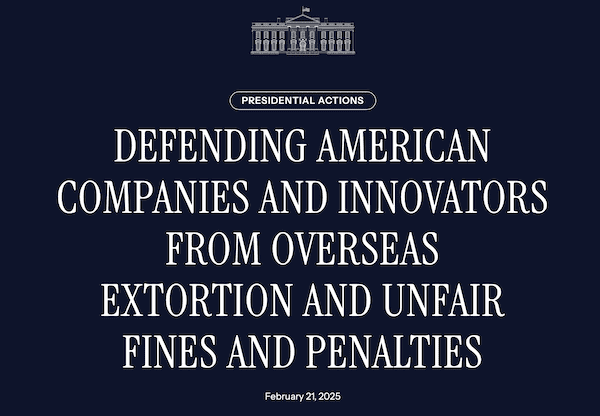
As the United States grapples with an increasingly assertive executive branch, a recent presidential memorandum titled “Defending American Companies and Innovators from Overseas Extortion and Unfair Fines and Penalties” reveals a disturbing pattern of nationalist economics that experts warn could pave the way for authoritarian control. This February 21st directive, cloaked in the language of protecting American businesses, represents a significant escalation in the administration’s America First agenda—one that bears striking similarities to historical patterns of authoritarian consolidation of power.
The Facade of Economic Protection
The memorandum’s opening statement sets an ominous tone: “My Administration will not allow American companies and workers and American economic and national security interests to be compromised by one-sided, anti-competitive policies and practices of foreign governments.” While this might sound reasonable on the surface, the directive’s actual provisions reveal a more sinister agenda of economic isolation and executive overreach.
Consider Section 2’s sweeping authority: “where a foreign government… imposes a fine, penalty, tax, or other burden that is discriminatory, disproportionate, or designed to transfer significant funds or intellectual property from American companies… my Administration will act, imposing tariffs and taking such other responsive actions necessary.” This open-ended mandate effectively grants the executive branch unprecedented power to retaliate against any foreign regulation it unilaterally deems unfair.
The Historical Echo Chamber
The language and structure of this memorandum eerily mirror the economic nationalism that preceded authoritarian takeovers in 20th-century Europe. Just as those regimes used external threats to justify concentrated power, this directive portrays legitimate foreign regulation as “extortion” and “plunder.” The memorandum states explicitly that “American businesses will no longer prop up failed foreign economies through extortive fines and taxes”—rhetoric that dangerously oversimplifies complex international relations while stoking nationalist sentiments.
Dismantling Democratic Safeguards
Perhaps most concerning is Section 3’s systematic dismantling of multilateral frameworks. The directive instructs various agencies to investigate and potentially retaliate against digital service taxes from multiple allied nations, including the UK, France, and Canada. This unilateral approach bypasses established international dispute resolution mechanisms, setting a dangerous precedent for executive authority unchecked by diplomatic norms or international law.
The memorandum’s Section 3(d) contains particularly troubling language about investigating European and UK policies that might “undermine freedom of speech and political engagement or otherwise moderate content.” This provision could be used to attack legitimate content moderation efforts, potentially protecting and amplifying extremist viewpoints under the guise of free speech protection.
Economic Isolation as a Path to Authoritarianism
The directive’s approach to international trade bears hallmarks of authoritarian economic policy:
- Centralization of Power: The memorandum repeatedly emphasizes executive authority, with phrases like “my Administration will act” appearing throughout.
- Rejection of International Cooperation: Rather than working through established diplomatic channels, the directive threatens unilateral action against multiple allied nations.
- Creation of External Enemies: The text consistently frames foreign governments as hostile actors engaging in “extortion” and “plunder,” creating a narrative of victimization that historically precedes authoritarian consolidation.
The Road to Resistance
In the face of this concerning directive, several avenues for democratic resistance remain:
Legal Challenges
Organizations can challenge specific implementations of this memorandum through:
- Administrative Procedure Act litigation
- Constitutional challenges to executive overreach
- International trade dispute mechanisms
Economic Pressure
Businesses and consumers can:
- Support companies that maintain ethical international practices
- Engage in shareholder activism to oppose isolationist policies
- Document and publicize the economic damage caused by retaliatory measures
Political Action
Citizens can:
- Contact representatives about the dangers of economic nationalism
- Support candidates who prioritize international cooperation
- Join or support organizations monitoring executive overreach
A Critical Moment for Democracy
As this memorandum demonstrates, the pathway to authoritarianism often begins with seemingly reasonable protections for national interests. The directive’s combination of expansive executive authority, economic nationalism, and hostile rhetoric toward allies represents a dangerous step toward isolated, authoritarian governance.
The crucial question facing Americans today is not whether our companies need protection, but whether we will allow legitimate concerns about fair trade to be weaponized into tools of authoritarian control. As history has shown repeatedly, the erosion of democratic norms often begins with economic nationalism before expanding to broader attacks on democratic institutions.
The time for resistance is now, before these policies become entrenched and their authoritarian implications become irreversible. Our democracy’s future may depend on how we respond to this critical moment.
Take Action Now:
- Contact your representatives: [Congressional switchboard: (202) 224-3121]
- Join democracy watchdog organizations
- Support legal challenges to executive overreach
- Document and report the impact of these policies on your business or community
Remember: History will judge not just the actions of this administration, but how we as citizens responded to the rising tide of authoritarianism in our time.

